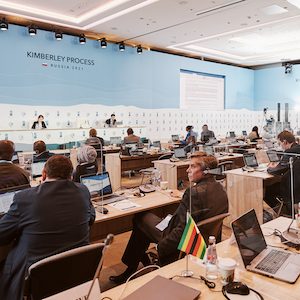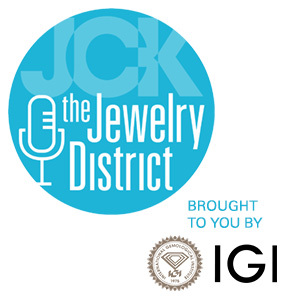
The Central African Republic (CAR) is asking the chair of the Kimberley Process (KP) to issue an administrative decision allowing the organization to suspend countries that promote “competing certification systems”—specifically singling out the G7’s plan to sanction Russian diamonds.
Sources tells JCK that CAR’s proposal is highly unlikely to pass, as KP decisions require absolute consensus and G7 members would almost surely block it. But the sources note that the move shows how divided the KP is on the issue of Russian diamonds.
In a letter to KP chair Ahmed bin Sulayem, CAR minister of mines and geology Rufin Benam Beltoungou said that when countries establish alternate certification schemes, it “sends a contradictory message to our international partners and weakens the KP’s position on the global stage.”
Beltoungou urged the KP chair to “remind these member states of the importance of fully adhering to the Kimberley Process principles and highlight the inherent risks of any competing initiative.”
The “administrative decision” Beltoungou seeks goes even further, requiring that “all member states must, as a condition of their participation in the Kimberley Process, strictly adhere to its defined principles and refrain from promoting, supporting, or implementing competing certification systems, such as the G7[’s].”
This proposed rule would require countries that promote alternate systems to “submit a formal explanation” to the chair, according to Beltoungou’s letter. If countries “persist in promoting or implementing G7 certification despite warnings and requests for clarification,” the chair should consider suspending them.
“This suspension would aim to preserve the integrity of the process and firmly signal that any action contrary to the KP principles will not be tolerated,” the letter concluded.
Hans Merket, a researcher and policy manager for the International Peace Information Service and a member of the Kimberley Process Civil Society Coalition, tells JCK by email: “I believe those who submitted this proposal know full well that there is no chance the KP can reach consensus on this issue. In my view, its intentions have little to do with the KP or diamond governance and should instead be understood through a geopolitical lens. G7 countries have recently found themselves rather isolated within the KP—perhaps more so than in any other forum—due to the KP’s insular and peculiar dynamics.
“With Western countries tending to support Ukraine’s proposal to initiate a KP discussion on Russian conflict diamonds, each ‘camp’ now has its own proposal that the other opposes—a recipe for a bidding war of accusations, deeper stalemates, and distraction from the serious reforms the KP should be undertaking.”
The G7 has been trying for nearly two years to develop a tracking scheme to keep Russian diamonds out of its markets. Current U.S. law bans the import of any rough or polished diamonds 0.5 ct. or larger that was mined or polished in Russia.
The Central African Republic itself was suspended from the Kimberley Process for 11 years, due to fighting in its diamond fields. That embargo was lifted last year.
The CAR ministry did not respond to a request for comment. Bin Sulayem declined comment.
Top: A meeting of the Kimberley Process (photo courtesy of the Kimberley Process)
- Subscribe to the JCK News Daily
- Subscribe to the JCK Special Report
- Follow JCK on Instagram: @jckmagazine
- Follow JCK on X: @jckmagazine
- Follow JCK on Facebook: @jckmagazine





